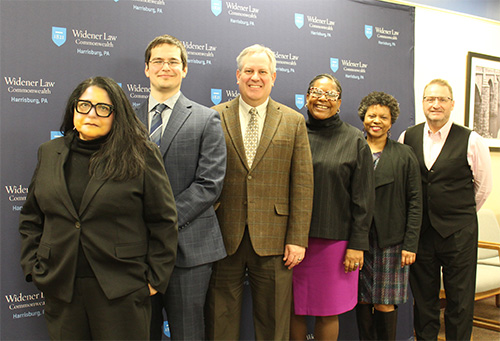
Navigating Difficult Conversations: Widener Law Commonwealth’s Annual Dean’s Diversity Forum
Widener University Commonwealth Law School recently hosted its 18th annual Dean’s Diversity Forum, an event designed to foster meaningful discussions on legal education and practice. This year’s theme, "Difficult Conversations: Equitable Inclusion," explored how legal professionals can engage in challenging discussions with professionalism and respect.
The event opened with a panel discussion, Engaging in Practical Pluralism, moderated by second-year law student Ely Zeigler, a Center for Equity & Justice fellow. Panelists included Michael Hussey, associate professor of law at Widener Law Commonwealth; Danielle M. Conway, dean at Penn State Dickinson Law; Guadalupe T. Luna, visiting professor of law at Widener Law Commonwealth; and Kellyn O. McGee, associate professor of law and faculty director for the Center for Equity & Justice. The discussion focused on fostering constructive discourse and embracing diverse viewpoints in legal education and practice.
To illustrate the importance of connection, Conway asked attendees to sit together rather than spread out in the large lecture space, emphasizing that community-building starts with engagement. Luna reinforced this idea, stating, "Lawyers are problem solvers, and understanding different perspectives is crucial to that role."
Panelists also highlighted initiatives designed to support aspiring attorneys. McGee discussed Widener Law Commonwealth’s LSAT Pathway Program, funded by the Law School Admission Council and taught by current students and graduates of WLC, which provides free preparation courses for students pursuing legal careers.
Hussey emphasized the importance of maintaining professionalism while navigating difficult conversations, a skill essential for effective advocacy.
Student organizations also played a key role in the forum. Gabe Kuehn, a center fellow, discussed initiatives that support students entering the legal field. Miss-Kye Gallon, president of the Black Law Students Association, highlighted mentorship programs within the organization. Kimberly Diaz, president of the Latin American Law Students Association, spoke about the importance of cultural representation in legal discussions. Emily Corcuera, secretary of the Asian Pacific American Law Student Association, shared how the organization fosters a sense of community and professional growth through networking opportunities and partnerships with the Minority Bar Committee.
The second panel, "Modeling Difficult Conversations: Equitable Inclusion," was moderated by third-year law student Tara R. Smith and featured a distinguished group of legal professionals. Panelists included andré douglas pond cummings, dean and professor of law at Widener Law Commonwealth; Todd J. Clark, dean at Widener University Delaware Law School; Michael R. Dimino Sr., professor of law at Widener Law Commonwealth; and Wally Zimolong of Zimolong LLC.
cummings opened the discussion by providing historical context on representation in law. “The legal profession has long grappled with questions of opportunity and access,” he said, emphasizing the role of pathway programs in expanding opportunities for aspiring lawyers.
Dimino acknowledged the complexity of the discussion, noting that while inclusivity is widely valued, perspectives on fairness can vary. Clark highlighted how diversity initiatives have historically expanded opportunities, particularly for women, and argued that fostering inclusion strengthens the legal profession by ensuring all qualified candidates have a fair chance to compete.
Zimolong emphasized the importance of open dialogue in shaping a legal system that reflects society’s needs.
Smith concluded by reinforcing the importance of open dialogue in legal education. “Discussions like these challenge us to be better advocates, better lawyers, and better members of society,” she said, reflecting the forum’s mission of fostering inclusive and respectful discourse.
